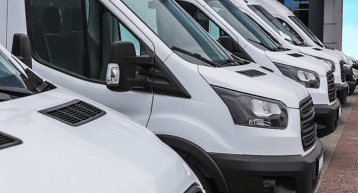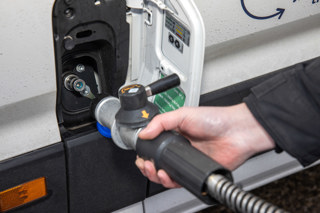Fleets could be left in an “impossible situation” if the Government does not clarify its position on whether diesel van production will be banned by the end of the decade.
The Labour election manifesto pledged to reinstate the ban for cars to 2030, something to which it has recommitted in recent days, but has yet to clarify whether the move will also apply to vans.
Highlighting the issue, Peter Golding, managing director of FleetCheck, said: “For many fleets, 2030 is less than one typical van replacement cycle away, and the lack of certainty is leaving them in an almost impossible situation.”
The current phase out date for petrol and diesel vans is set for 2035.
The AFP says that reinstating the 2030 phase-out date for the sale of new internal combustion engine (ICE) vans is not “practicable”.
Golding added: “While electric car adoption by fleets has generally been a considerable success and the 2030 phase-out is absolutely viable, almost the opposite is true of electric vans.
“Compromises over range, payload and charging times mean that fleet sales of new electric vans are struggling to rise above 5% and there appears to be limited prospects of this changing dramatically unless that is some kind of unforeseen paradigm shift.”
He explained that the objections fleets had to electric vans were purely practical, with their use for anything other than local, light duty work proving questionable.
Golding said: “Fleets are looking at the ZEV Mandate – which will see electric van production rise from 10% of sales this year to 70% by 2030 – alongside the potential 2030 production ban, and they just can’t foresee how the situation is going to be resolved.
“This is not a scenario where fleets are against zero emissions vehicles – almost all want to play their part in creating cleaner air and minimising the impact of climate change – but they believe that the electric vans on offer currently are simply not fit for their needs.
“You cannot force companies to buy vehicles they don’t want. Certainly, we speak to more fleets that are planning to continue to operate diesel vans in perpetuity than those who see electrification from 2030 as a viable option.”
There are three potential solutions that could start to move the dial substantially, Golding explained – taxation moves that provided an undeniable incentive for van electrification in the same manner as benefit-in-kind taxation has done for electric cars, a massive improvement in electric van technology, or dramatically lower electric van pricing.
He said: “The fact is that none of these developments are likely to happen, at least by 2030. There are not really any carrots that the government or manufacturers can offer that look likely to change the mind of fleets who are dead set against electrification on practical grounds.
“The only other option that remains in this situation is for the government to effectively tax diesel vans out of existence but, given the level of resistance from businesses, the VED rate imposed would have to be very high rather than simply tweaked. The question is whether the government would want to pursue what is likely to be a deeply unpopular policy.”
The best option at this point in time would be for the government, fleets and operators to have an in-depth conversation about electric vans, how their role can practically be increased over time, and what shape official policy should take, Golding added.
He said: “At the moment, it does look very much as though government policy is diametrically opposed to practical fleet considerations and, at some point, something will have to give.”






















Philip Clarke | TUAL Pro Powerbanks - 03/09/2024 12:30
Pretty weak stuff this. Our research suggests that the latest generation of vehicles can cover at least 70% of routes and use-cases, especially when twinned with powerbank range-extenders. We need both supply and demand-side levers to make this happen. Demand side incentives and mandates will underpin eLCV RVs, unlock capital budgets and give sustainability and fleet leaders the strategic cover to make change happen.